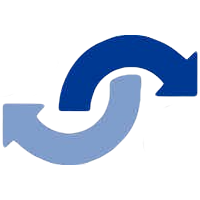If you’ve been to a formal interview or if you’ve been researching how to prepare for one, you are most likely familiar with the famous last question that interviewers and hiring managers are known to present at the end of their line of questioning. It typically sounds something like, “do you have any questions for us”? Though it is common, this question is frequently one of the last that interviewees think to prepare for, and often when it’s presented it can feel like you’ve been put on the spot. If you are in the midst of your job search and would like some assistance in your prep, Career Contacts is here to provide some context around this question and why it’s important, as well as examples of 5 questions to ask an interviewer that will show you’ve come prepared.
Why have at least one question prepared?
While it might seem that interviews are designed for an employer to get to know you and decide whether or not you would be the right fit for the role and for their company, what many interviewees often forget to consider is that it is also a chance for you to get to know more about the position and the employer and whether you feel it would be the right opportunity for you to pursue. When a hiring manager opens up the floor for you to ask any questions, it’s an invitation to not only provide some additional background on yourself that could make you an even more promising candidate, but to also ask any pressing questions that you might have about the details of the job description or about the organization or team as a whole. Though it’s not mandatory to have questions at the end of an interview, many hiring experts agree that it certainly makes a candidate seem more interested, engaged, and prepared when they have at least one thoughtful question at the ready. Having the right enquiries on hand can show that you’re proactive and that you’ve done your research about the role, the company, and the hiring process.
It is important to note that there may not always be time at the end of an interview for all of the questions you may have about the role. Additionally, keep in mind that many questions may be answered throughout the discussion and some may have to be saved for an introduction upon getting hired, but when the end of the interview arrives and you’re put in the spotlight, here are some examples of queries that you can have on hand:
- Are there any concerns about my resume that have not been addressed?
This can be a good way to segue from the discussion about your background into the questions for your interviewer by giving them an opportunity to ask anything that they may have forgotten to touch on during their questioning. It also gives you an opportunity to get ahead of any apprehensions that they may have in hiring you for the role. For example if there are any gaps on your resume, this could be a great time to mention any reasons that you were not employed at the time, or any side projects that you were participating in that were not necessarily applicable to a resume but may be of value.

2. How is success measured at this company and in this role?
Depending on who you ask, success is measured differently everywhere you go. One employer’s idea of success may mean meeting an individual daily or weekly quota of some kind. Another employer may measure success by how much an employee contributes to the overall goals of their department. By asking this, you can show that you have an interest in what taking on this role would mean in the big-picture sense. It’s a good way to learn about what is most important to accomplish should you end up getting hired and it’s an excellent way to let the hiring manager know that you would be a dedicated employee.
3. What would a day in this role look like?
Should you make it through the hiring process, what can you expect when you start this new position? Are there any daily tasks or responsibilities that conflict with your current working style? This is a great way to get to know the role more in depth to determine if it would be a good fit or if there are any parts of the new routine that would take some additional getting-used-to. Asking what an average day may look like is another way to show that you take initiative and can also further the conversation in which you can mention more about your applicable background.
4. What is one obstacle that someone in this role may face?
Obstacles are inevitable with any position. Knowing what you may be up against should you get hired for this position can let you know if you believe this role would be a good fit. Additionally, asking this question will not only let you know more about the role and what to expect should you get the job, but it can also show that you are thinking ahead and planning ahead of time for any issues that may arise. This could also present an opportunity to mention how you might handle such an obstacle, demonstrating how you could apply your problem-solving skills.
5. What is a core value that is important for an employee at this company to have?
Getting to know the core values that are important to a company is an excellent way to get a feel for the environment that you will be potentially working in if chosen for the role. Perhaps their core value is integrity; this lets you know that in order to put your best foot forward for this role, you can focus on and prioritize demonstrating your honesty in any communication moving forward. Alternatively, their core value could be loyalty, stressing that dedication and growth within the company is something that they center. In this case you can ensure that in any further interactions, you’re at your most present and enthusiastic about the ways that you could contribute to the future of the organization. This can also be an excellent question to wrap up an interview and a positive note to end on.

Thoughtfulness Can Go a Long Way
Making an insightful inquiry at your next interview can show that you are ahead of the game, optimistic, and preparing for the best-case-scenario of you landing the position. Of course, it’s important to keep in mind that interviewers are often on a tight schedule, so be sure to remain aware of the clock and conscientious that their time may not allow for numerous questions at the end of your allotted interview window. If you reach the end of the interview process and you find yourself with more than one query, it can be a courteous gesture to ask the interviewer or hiring manager how many questions they have the time for and keep your most pressing question at the forefront of your mind in case they are on a time crunch.
Overall, being prepared with engaging and thoughtful questions for your interviewer can be exceptionally helpful in making the best first impression possible. Keep these 5 questions at the ready while you prepare for your upcoming interview and use them as inspiration for any others that you may want to bring up next time you are in the hot seat.
For more tips and insight on interviewing and employment be sure to stay tuned to our blog and follow us on LinkedIn!


